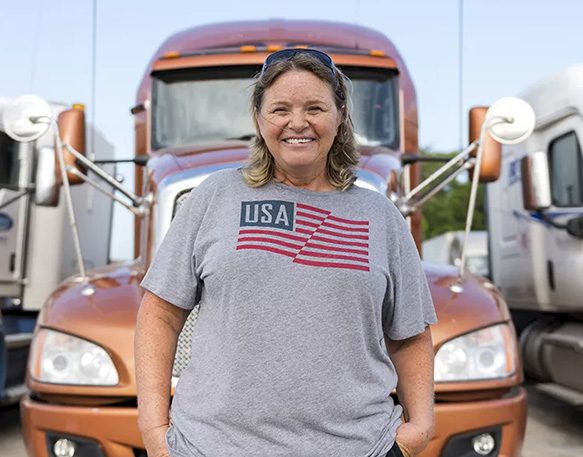The trucking industry is highly regulated, so every carrier or owner-operator must ensure they’re good to go with the United States Department of Transportation (DOT) and the Federal Motor Carrier (FMCSA) before hitting the road to transport freight. For many, this means getting their DOT number and MC number.
Before you can start your business, you need to know the difference between DOT and MC numbers to ensure you don’t face heavy fines, can keep your business up and running, and can stay on the right side of the law, the DOT, and the FMCSA. Unsure of how they differ? Don’t worry! We’ll review the difference between DOT and MC numbers, what each number means, who needs them, what you’ll need to do to obtain yours, and more.
What is a DOT number and who needs one?
What is a DOT number?
A DOT number, also known as a USDOT number or an FMCSA DOT number, is a number assigned by the FMCSA that can be used as an identifier for your company. DOT numbers are generally eight digits long and should be printed or painted on your truck’s cab. If your business has multiple trucks, they display the same DOT number.
Your DOT number will enable the FMCSA to collect and monitor safety information about your company acquired during compliance reviews, audits, inspections, and crash investigations. All of this information will be public and accessible via the FMCSA’s website.
Who needs a DOT number?
When it comes to who needs a DOT number, there are a lot of rumors flying around, making it difficult to know who needs a DOT number. For example, some claim that you won’t need a DOT number if your company only operates within one state. For a small selection of people, that is true. However, you’ll need to meet various requirements to be exempt from holding a DOT number — and most carriers and owner-operators wind up needing a DOT number.
You’ll need a DOT number if:
- Your commercial motor vehicle has a gross vehicle weight or gross combination weight of 10,001 pounds or more
- You plan on driving interstate routes
- You’re transporting 9-15 passengers for hire
- You’re transporting over 15 people (with or without compensation)
- You’re hauling hazardous materials
Even if you drive a light vehicle, avoid interstate routes, refuse to haul hazardous materials, and only ever have yourself in your truck, you may still need to register for a DOT number. States that require intrastate commercial motor vehicle registrants to have a DOT number include:
- Alabama
- Alaska
- Arizona
- California
- Colorado
- Connecticut
- Delaware
- Florida
- Georgia
- Hawaii
- Idaho
- Indiana
- Iowa
- Kansas
- Kentucky
- Maine
- Maryland
- Massachusetts
- Michigan
- Minnesota
- Missouri
- Montana
- Nebraska
- Nevada
- New Jersey
- New York
- North Carolina
- Ohio
- Oklahoma
- Oregon
- Pennsylvania
- South Carolina
- Texas
- Utah
- Washington
- West Virginia
- Wisconsin
- Wyoming
- Puerto Rico
The list of people who don’t need a DOT number is much shorter. Those exempt include those transporting items for free and those operating in one of the states that don’t require DOT registration. Just keep in mind that driving without a DOT number can severely limit your business.
For example, if you live in and operate your business in Vermont, your truck couldn’t leave the state for even a short piece of your route if it weighed over 10,000 pounds or was carrying hazardous materials. Given how tiny Vermont is, that may be incredibly difficult and significantly restrict your business opportunities. So, even if your state doesn’t technically require you to hold a DOT number, it may be a good idea to have one just in case you have to cross state lines, either for more business or a last-minute reroute. After all, the fines for non-compliance are steep, so it’s always better to be safe than sorry.
How to get a DOT number: Step-by-step guide
So, how can you get one of these numbers from the Department of Transportation? By filling out paperwork! If this is your first time registering for a DOT number, you’ll need to use the Unified Registration System (URS), which is available on the FMCSA website, and follow these steps:
- Head to the official FMCSA website
- Click on the Registration tab
- Select Apply for a New USDOT Number and/or Authority, which will take you to the URS wizard
- Click the New Applicant button and follow the instructions
- Enter your business name and location, personal contact information, a valid address, your operation classification, your cargo classification, information on the type and ownership of vehicles, and more
Meeting DOT number requirements may seem like a lot, but don’t worry! If you run into trouble, you can ask a representative for help using the chat function. Or, you can use the DAT Copilot™ Authority Program to get your business up and running even faster.
How long does it take to get a DOT number?
After you complete your online application, you’ll receive a DOT number immediately, assuming there aren’t any problems with your application. However, you can’t start operating under your new FMCSA DOT number until you’re granted operating authority. This will likely take around 25 days, so you need to be patient.
If you choose to apply for your USDOT number by mail, the processing time will be four to six weeks—and your application will be rejected if it’s unreadable, unsigned, or incomplete.
How much does a USDOT number cost?
Starting a new business can be expensive, but the good news is that there is no filing fee associated with FMCSA DOT number registration!
However, heavy fines are associated with breaking DOT number requirements, such as not having a DOT number when one is mandatory. You could end up paying thousands of dollars in fees, so it’s definitely worth applying for a USDOT number if you think there’s any chance you might need it.
What is an MC number and who needs one?
What is an MC number?
In addition to a DOT number, many companies need an MC number, also known as a Motor Carrier number or operating authority, before they hit the road. This number is assigned by the FMCSA to identify your operating or trucking authority and is given to commercial motor vehicles that participate in interstate commerce (a.k.a. haul loads over state lines).
Who needs an MC number?
Not all commercial vehicles or interstate moving companies need MC numbers, but many do. Will your company transport passengers in interstate commerce? You’ll need an MC number. Will you transport federally regulated commodities across state lines? You’ll also need a Motor Carrier number.
If your company only operates within one state or exclusively hauls exempt commodities, you may not need an MC number. Additionally, you will be exempt from interstate authority rules if you work in a designated commercial zone where free movement of goods and people is necessary, such as the Washington, D.C./Maryland/Virginia geographic territory.
However, it’s important to note that MC numbers are being phased out as part of an ongoing overhaul of the Federal Motor Carrier Safety Administration’s (FMCSA) registration system. Instead, the FMCSA plans to use USDOT numbers as the solo identifier for all users on their platform to streamline registration processes and combat fraud. The exact timeline for this transition is still unfolding.
How to get an MC number
Registering for your Motor Carrier number is simple! To apply for your MC number, head to the FMCSA website.
If you’ve never registered with the FMCSA and don’t have a DOT number yet, click on Apply for a New USDOT Number and/or Authority from under the Registration tab. Hit the New Applicant button in the URS wizard and enter the necessary information when prompted. On the other hand, if you already have a DOT number or previous MC authority, you can use the FMCSA’s legacy registration system.
How long does it take to get an MC number?
Usually, it will take 20-25 business days for a carrier to receive their MC number. However, if your application is flagged for additional review by the FMCSA, you can expect an additional eight weeks or longer of wait time.
You can check in on your MC authority status by visiting the SAFER website, clicking Licensing & Insurance under the FMCSA Searches heading, entering the MC number in the box, and clicking search. You can then scroll down and click Authority History to view the date the operating authority was granted.
In most cases, the FMCSA will send out operating authority documents 3-4 business days after the Motor Carrier number has been granted. If over 10 days have passed since the operating authority grant date and you haven’t received the documents, consider getting in touch with the FMCSA Contact Center via phone or their web form.
How much does an MC number cost?
While DOT numbers are free, the FMCSA charges a $300 filing fee for permanent authority per operating class. You can cover the MC number cost using a credit card or a check sent through the USPS.
If you need to reinstate your authority in the future, it will cost an additional $80, and, if you want to change your business’s name, the name change fee is $14.
What is the difference between a DOT number and an MC number?
Still a little confused about what is the difference between DOT number and MC numbers? Let’s break down some of the main differences between the two numbers.
Who needs a DOT number and who needs an MC number?
DOT numbers and MC numbers are not one and the same, so some people need just one, while others need both.
In general, most companies, barring those operating small fleets in states where DOT numbers are not required, need a USDOT number. On the other hand, only companies that transport passengers across state lines or engage in interstate commerce with regulated commodities need MC numbers. So, many companies that only operate in one state don’t have an MC number.
What are DOT and MC numbers used for?
While a DOT number is simply for filing use in the FMCSA system, an MC number permits you to operate as a commercial trucking company.
What do DOT numbers and MC numbers look like?
Another area where DOT and MC numbers differ is their look. While both numbers should be printed on your truck’s cab, they don’t look the same.
DOT numbers are always preceded by the letters USDOT and are generally longer, whereas MC numbers will have the abbreviation for the state you’re operating out of in front of the number and will usually be shorter. The USDOT number will be above the MC number.
How much does it cost to get a DOT number and an MC number?
While you can get your DOT number for free, your MC number will cost $300 for each operational class you need to register in.
Starting your trucking business: Understanding DOT and MC numbers and other key steps
Starting a trucking business involves navigating many regulations, including understanding the difference between a DOT number and an MC number. Both numbers have specific requirements depending on the type of business you run and the freight you transport.
To make the process smoother, the DAT Copilot™ Authority Program can help manage your paperwork, saving you time and stress as you work to get your business off the ground. From filing your DOT and MC number applications to ensuring compliance, the DAT Copilot™ Authority Program is there to support you.
Beyond legal paperwork, you’ll also need to handle tasks like applying for an Employer Identification Number (EIN), choosing a business structure, and finding freight. While starting a trucking business is challenging, with the right preparation and support, you can set yourself up for success.
Earn your trucking MC authority with DAT
Getting your trucking authority can seem overwhelming, but you can’t start your business without it!
That’s where DAT Copilot™ Authority Program comes in. We’ll take care of your MC and DOT number paperwork, ensuring you have all the necessary permits to operate legally.
Sign up for DAT Copilot™ Authority Program today to get started!




